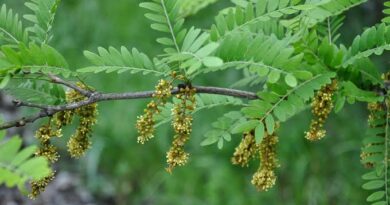Health Benefits and Uses of Mustard Seed
Mustard seed is a small, round seed that comes from the mustard plant, which is a member of the Brassicaceae family. Mustard seeds can vary in color from yellow to black, and they have a pungent and spicy flavor.
Mustard seeds have been used for thousands of years as a spice, condiment, and medicinal herb. They are often used in cooking, especially in Indian and Middle Eastern cuisine, to add flavor and heat to dishes such as curries, pickles, and chutneys.
In addition to their culinary uses, mustard seeds have also been used for their medicinal properties. They contain compounds called glucosinolates, which have been shown to have anti-inflammatory, antioxidant, and anti-cancer effects. Mustard seed oil is also used in traditional medicine for its analgesic and anti-inflammatory properties.
Mustard seeds are a versatile and flavorful ingredient that can be used in a variety of dishes, and they also offer potential health benefits.
There are three main types of mustard plants that are cultivated for their seeds: black mustard (Brassica nigra), brown mustard (Brassica juncea), and white mustard (Sinapis alba). Each type of mustard plant produces seeds with a slightly different flavor and appearance.
In terms of botanical names, black mustard is known as Brassica nigra, brown mustard is known as Brassica juncea, and white mustard is known as Sinapis alba.
Read Also: Guide on How to Determine Fertilizer Needs
Description of Mustard Seed
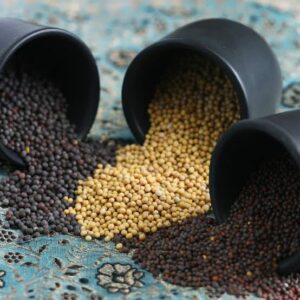
Mustard seeds are small, round or oval-shaped seeds that come from the mustard plant, which is a member of the Brassicaceae family. They are typically 1-2 millimeters in size and range in color from yellowish-white to black, depending on the variety of the mustard plant.
The seeds have a hard outer layer that can be removed by soaking the seeds in water before use. When crushed or ground, the seeds release an aromatic, pungent flavor that is often used to add a spicy kick to dishes.
The flavor of mustard seeds can vary depending on the variety of the plant, with black mustard seeds having a stronger and more pungent flavor than yellow or white mustard seeds.
Mustard seeds are a versatile ingredient that can be used in a variety of ways in cooking. They are often used to make mustard sauces, marinades, and pickles, and are also used as a seasoning for meats, vegetables, and soups.
In addition to their culinary uses, mustard seeds are also believed to have some health benefits due to their high content of antioxidants and anti-inflammatory compounds.
Types of Mustard Seed
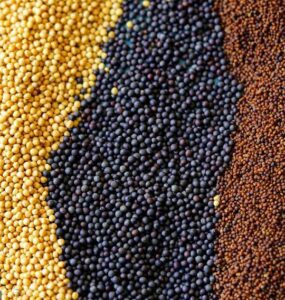
There are several types of mustard seeds, each with their own unique flavor and culinary uses. Here are three common types of mustard seeds:
Yellow Mustard Seeds: These are the most commonly used mustard seeds in the United States. They are small and round, with a light brown or yellowish color. The botanical name for yellow mustard is Brassica hirta or Sinapis alba.
Brown Mustard Seeds: These seeds are slightly larger than yellow mustard seeds and have a dark brown color. They have a sharper, more pungent flavor than yellow mustard seeds and are commonly used in Indian and Asian cuisine. The botanical name for brown mustard is Brassica juncea.
Black Mustard Seeds: These seeds are the smallest of the three types of mustard seeds and have a dark black or dark brown color. They have the strongest and most pungent flavor of all the mustard seeds and are often used in Indian cuisine. The botanical name for black mustard is Brassica nigra.
All three types of mustard seeds come from different species of the Brassica family and can be used in a variety of ways in cooking, including pickling, marinades, sauces, and spice blends. They are also a good source of vitamins and minerals and have been shown to have potential health benefits, such as reducing inflammation and improving digestion.
Read Also: How Long do Cats Live and the Different Types of Cats
16 Health Benefits of Mustard Seed
Mustard seeds have been used for centuries both for their culinary and medicinal properties. Below are 16 potential health benefits of mustard seeds:
1. Rich in nutrients: Mustard seeds are a good source of several important nutrients, including calcium, iron, magnesium, phosphorus, potassium, and zinc.
2. Anti-inflammatory properties: Mustard seeds contain compounds that have been shown to have anti-inflammatory effects, which may help reduce the risk of chronic diseases such as arthritis, heart disease, and cancer.
3. Antioxidant properties: Mustard seeds are rich in antioxidants, which can help protect the body against oxidative stress and damage caused by free radicals.
4. Digestive health: Mustard seeds contain compounds that may help improve digestion and reduce symptoms of digestive disorders such as bloating, gas, and constipation.
5. Respiratory health: Mustard seeds have been used traditionally to relieve respiratory symptoms such as coughing and congestion.
6. Heart health: Mustard seeds may help improve heart health by reducing inflammation, lowering cholesterol levels, and improving blood flow.
7. Bone health: Mustard seeds are a good source of calcium and other minerals that are important for maintaining strong and healthy bones.
8. Diabetes management: Mustard seeds may help regulate blood sugar levels and improve insulin sensitivity, which can be beneficial for people with diabetes.
9. Immune system support: Mustard seeds contain compounds that have been shown to support the immune system and help fight off infections and diseases.
10. Pain relief: Mustard seeds contain compounds that have been shown to have analgesic properties, which may help relieve pain and inflammation.
11. Skin health: Mustard seeds contain vitamin E and other nutrients that are important for maintaining healthy skin.
12. Anti-cancer properties: Mustard seeds contain compounds that have been shown to have anti-cancer properties and may help reduce the risk of certain types of cancer.
13. Weight management: Mustard seeds may help support weight loss and weight management by increasing metabolism and reducing appetite.
14. Antimicrobial properties: Mustard seeds have been shown to have antimicrobial properties and may help protect against bacterial and fungal infections.
15. Anti-aging properties: Mustard seeds contain compounds that have been shown to have anti-aging properties and may help reduce the risk of age-related diseases.
16. Hair health: Mustard seeds contain nutrients that are important for maintaining healthy hair, such as vitamin E and omega-3 fatty acids.
Uses of Mustard Seed
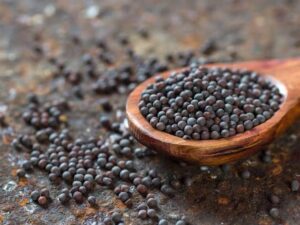
Mustard seeds have a variety of culinary uses and are also used for medicinal and cosmetic purposes. Here are some common uses of mustard seeds:
Cooking: Mustard seeds are a common spice used in cooking around the world. They can be used to add flavor and heat to dishes such as curries, marinades, pickles, and sauces.
Pickling: Mustard seeds are often used in pickling recipes to add flavor and help preserve vegetables.
Seasoning: Mustard seeds can be ground and used as a seasoning for meats, vegetables, and soups.
Condiment: Mustard seeds are commonly used to make mustard condiments, which can range from mild to spicy depending on the type of mustard seeds used.
Medicinal use: Mustard seeds have been used for centuries in traditional medicine to treat a variety of ailments, including digestive issues, respiratory problems, and joint pain.
Massage oil: Mustard oil, which is extracted from mustard seeds, is used as a massage oil in some cultures. It is believed to have warming and pain-relieving properties.
Hair care: Mustard oil is also used as a hair treatment to improve scalp health, promote hair growth, and condition hair.
Cosmetics: Mustard seed powder is sometimes used in cosmetics and skin care products due to its anti-inflammatory and exfoliating properties.
Mustard seeds are a versatile ingredient that can be used in many different ways in cooking and also have a variety of potential health benefits.
Nutritional value of Mustard Seed
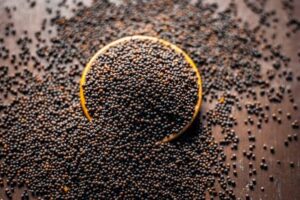
Mustard seeds are a good source of several nutrients, including:
Protein: Mustard seeds contain about 25% protein by weight, making them a good source of plant-based protein.
Fiber: Mustard seeds are a good source of dietary fiber, which can help promote digestive health and reduce the risk of certain diseases.
Healthy Fats: Mustard seeds contain healthy fats, including omega-3 and omega-6 fatty acids.
Vitamins and minerals: Mustard seeds are a good source of several vitamins and minerals, including vitamin B1, vitamin B6, vitamin E, calcium, magnesium, and potassium.
Antioxidants: Mustard seeds contain antioxidants, such as selenium and magnesium, which can help protect cells from damage caused by free radicals.
It is very important to note that the exact nutritional value of mustard seeds can vary depending on the variety and how they are prepared.
For example, mustard oil, which is extracted from mustard seeds, is high in monounsaturated and polyunsaturated fats but is also high in calories, so it should be consumed in moderation.
Read Also: Flowers (Angiosperms)


